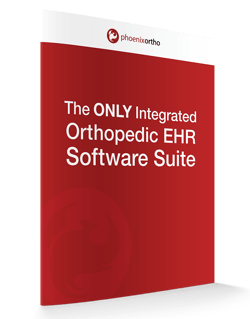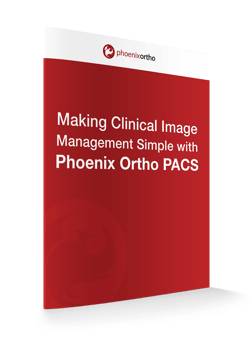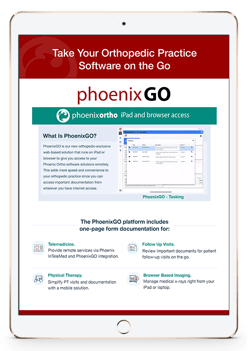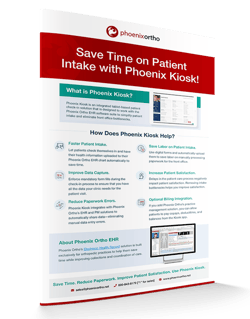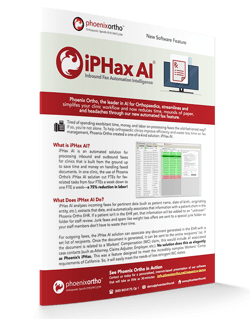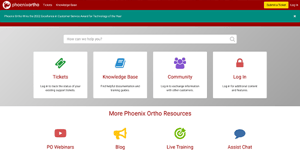Major announcement for all orthopedic EHR users as of January 2021 (edited to include important updates):
It’s a common story in the Electronic Health Record (EHR) vendor industry: A smaller company with a specialty-exclusive EHR software gets gobbled up by one of the larger, multiple specialty EHR vendors. Suddenly, there’s one less orthopedic-exclusive EHR platform in the world.
Last year, Phoenix Ortho’s only other orthopedic-exclusive EHR competitor was acquired by a multiple specialty EHR platform provider. This leaves Phoenix Ortho as the only orthopedic-exclusive EHR vendor in a market filled with inefficient multi-specialty EHRs and multiple specialty vendors that divide their attention between developing solutions for several types of practices at the same time.
What’s the Difference between Multi-Specialty and Multiple Specialty EHR Platforms?
The terms multi-specialty EHR software and multiple specialty EHR platform might cause some confusion, so it’s important to clarify these terms.
Multi-Specialty EHR
These are software programs that are intended for use by multiple medical specialties using a single interface instead of focusing on the needs of any one specific specialty. Such EHRs are common in primary care facilities that house multiple types of medical specialists.
Multi-specialty EHR vendors have one software that tries to be all things to all medical industry users at the same time. These EHRs are generally marketed as being the “one size fits all” solution that any practice can use. However, this isn’t without its drawbacks.
A multi-specialty EHR platform forces users to either heavily customize it to make it work with their particular medical specialty or struggle with sifting through countless unnecessary forms every time they use it. Either way, the practice is wasting time and resources on optimizing a software that isn’t really built for their needs.
Multiple Specialty EHR Vendors
Instead of having a single software that addresses all types of medical practices, a multiple specialty EHR vendor will have several different EHR solutions that have different specialty-specific features.
On the one hand, this is often better for specialty practices like orthopedic clinics because the software used is meant for their specialty. However, it isn’t always the best user experience for orthopedic clinics and other clinics dedicated to a single specialty.
A major issue with many multiple specialty EHR vendors is that their resources aren’t focused like a truly specialty-exclusive vendor would be.
When customers pay money for product support and updates, they never know for sure if their funds are going to be applied to improvements for their specialty or another one. For example, if a multiple specialty EHR platform provider has more dermatologists than any other client type, then they may dedicate funds and resources towards optimizing their dermatology-specific EHR while orthopedic- or ophthalmology-specific EHR updates are left to languish.
Additionally, many big EHR vendors will advertise their slick-looking EHR software interfaces. While attractive, a quick look “under the hood” at the way they actually handle clinical workflows reveals a lot of issues that cause delays—such as missing critical steps in key workflows or having issues keeping up with the latest healthcare compliance requirements affecting that medical specialty.
It’s kind of like going to a used car lot, finding a salesman who gets you hooked on an extremely slick-looking brand-name sports car that they say is perfect for driving fast, then popping the hood to find a rusty 2-cylinder engine that tops out at 30 mph when you were expecting go 0 to 60 in 3.5 seconds.
In short:
- Multi-Specialty EHRs use a single software to serve all types of medical practices.
- Multiple Specialty EHR Vendors use multiple software programs to serve different types of medical specialties.
Why Specialty-Exclusive EHR Software Is the Best
Unlike multi-specialty EHR software that doesn’t really fit any specialty or a multiple specialty vendor that tries to divide their time and resources to be all things to all users (which they can’t), a specialty-exclusive EHR vendor picks a single discipline and sticks with it. This is how Phoenix Ortho made the best EHR solution for orthopedic practices—by being exclusively laser-focused on the needs of orthopedic clinics, doctors, and staff.
Where multi-specialty EHRs waste time with unnecessary forms and fields and multiple specialty EHRs have the breadth of the ocean and the depth of a spoon because of their split focus, specialty-exclusive EHR platforms can provide a greater depth of resources without wasting time.
For orthopedic surgeons, efficiency is key. Orthopedic clinics are one of the highest-volume specialties in medicine. Where a primary care physician might consider themselves busy if they see 30 people a day, an orthopedic surgeon might see that many patients before lunch. So, every second saved on each interaction can have a huge impact for an orthopedic clinic.
What Happens when a Multiple Specialty EHR Absorbs a Specialty-Exclusive EHR?
Despite claims to the contrary by big-name EHR vendors, when they buy a smaller specialty-specific EHR solution, they usually aren’t after the software. History shows that they’re buying up a competitor primarily to acquire their customer list and, eventually, encourage (or force) those acquired customers to migrate to the new platform.
This phenomenon isn’t exclusive to EHR vendors, either. As noted by Investopedia, “Mergers can give the acquiring company an opportunity to grow market share without doing significant heavy lifting. Instead, acquirers simply buy a competitor’s business for a certain price.”
What does this mean for users of that specialty-exclusive EHR software? In the short term, not much. The acquiring company usually won’t try to immediately sunset the software of the company they’ve acquired. However, that doesn’t mean that they’ll support it, either.
Over time, EHR users might notice that their software isn’t getting the right updates and enhancements to keep it competitive and/or efficient over time. Instead, their go-to software is left to rot, becoming old, clunky, and inefficient with time.
This is when the big EHR vendor will try to push the client onto the software that they made. For example, if a big-name multiple specialty vendor with an orthopedic EHR absorbed an orthopedic-exclusive vendor, then they would try to push their newly acquired customers onto their big-name software. They may even have the temerity to call it an upgrade.
However, the big vendor’s software may not be as capable, robust, or user-friendly as the software they’re used to. So, the users of the acquired EHR software may find themselves forced to deal with a substandard software or try to keep using the old software they liked, but isn’t getting any new updates ever again.
What Can You Do If Your Preferred Specialty-Exclusive EHR Vendor Gets Bought Out?
One of the first things many clinics might do if their specialty EHR vendor is bought out is try to keep using their old EHR. Or, they may simply make the switch to the multiple specialty vendor’s solution and simply deal with any inefficiencies that may cause.
However, in the case of orthopedic EHRs, there’s still an alternative: Making the switch to Phoenix Ortho.
Phoenix Ortho is an orthopedic-exclusive EHR solution that is laser-focused on the needs of orthopedic practices. Designed with the help of orthopedists, Phoenix Ortho is the only orthopedic-exclusive EHR vendor in the market.
Our EHR is designed to provide everything an orthopedic clinic needs from its EHR—and nothing that it doesn’t. This helps to create more streamlined and efficient clinical workflows for orthopedic practices—saving time, labor, and mouse clicks so orthopedists can help more patients without sacrificing their personal time.
Do you need a comprehensive, orthopedic-exclusive solution for managing your clinical workflows? Reach out to Phoenix Ortho today to get started!
About Phoenix Ortho
In 2006, Phoenix Ortho, much like its namesake, “rose from the ashes” of outdated and dysfunctional primary care and multiple specialty EHRs that wasted time and effort to create an orthopedic-exclusive software that would help save time and money while doing right by orthopedic specialists.
Phoenix Ortho offers a comprehensive software suite that combines Electronic Health Records, a Picture Archiving and Communication System (PACS), and a Practice Management (PM) solution to help orthopedic practices control their entire clinical workflow with ease. By eliminating extraneous solutions meant for other specialties, Phoenix Ortho keeps their EHR software suite simple to use and convenient for orthopedic clinic staff of all skill levels.
Furthermore, Phoenix Ortho provides unlimited training to software subscribers and leverages customer feedback when updating the software and designing new features. Ready to learn more? Click below to get started now!
Schedule a 1:1
Get in touch with Phoenix Ortho to learn more about how you can save time, money, and mouse clicks with an orthopedic-specific EHR.





